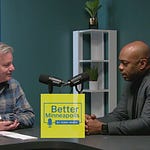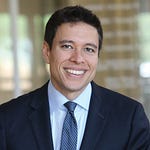In this conversation, longtime civic leader and former Park Board commissioner Bob Fine discusses his bid for the Minneapolis Board of Estimate & Taxation, the small but powerful body that sets the city’s maximum property-tax levy and manages its bonding authority. Drawing on 16 years of prior service on the board and decades of experience in public finance, Fine outlines his vision for restoring independent auditing, finding efficiencies in city operations, and protecting taxpayers from unnecessary increases. He also shares reflections on his lifelong ties to South Minneapolis, his skepticism of a city income tax, and his belief that sound fiscal management is essential to the city’s long-term health.
To learn more about Bob Fine, visit his website at:
Background and Experience
Bob Fine is seeking election to the Minneapolis Board of Estimate & Taxation (BET), where he previously served for 16 years while also representing the Park Board. A real estate attorney with extensive public service experience, Fine was often the “finance guy” on the Park Board—helping manage budgets, bond financing, and capital projects. He describes the BET as a little-known but powerful body that sets the city’s maximum property-tax levy and oversees bond issuance for major city improvements. Fine says his long tenure gives him a unique understanding of the city’s financial systems and the judgment to balance fiscal responsibility with civic priorities.
Core Issues and Priorities
Fine’s campaign centers on responsible budgeting, debt management, and restoring independent oversight. He supports reinstating the City Auditor under the BET—separate from City Hall—to ensure objective financial review across departments and the Park Board. He also proposes moving the city’s property appraisal function to Hennepin County, mirroring St. Paul’s arrangement with Ramsey County, which he says could save Minneapolis tax dollars by moving city costs to the county.
Fiscal Philosophy and Tax Policy
Throughout his public service, Fine has advocated for restraint in city spending. He recalls pressing for a 0% levy increase during tight budget years, arguing that departments should prioritize and make cuts rather than automatically raise taxes. He opposes the idea of a city income tax, warning it could drive residents and businesses to nearby suburbs, lower property values, and ultimately shrink the city’s tax base. Instead, Fine urges a focus on tightening budgets, eliminating redundant or outdated programs, and pushing the state for a fairer share of Local Government Aid—pointing out that Minneapolis pays more into the state than it receives in return.
Civic Engagement and Community Roots
Beyond his city and park roles, Fine has served on numerous cultural and environmental boards, including the Minneapolis Institute of Art, the Children’s Theatre Company, and several watershed organizations. He is also a longtime youth sports coach, having volunteered for over 50 years in baseball, softball, basketball, and soccer across South Minneapolis. A lifelong resident of the same neighborhood where he grew up, Fine describes himself as deeply committed to the city’s well-being. He currently serves on the Minneapolis Civil Rights Commission—the longest-serving commissioner in its history.
Political Perspective and Outlook
Fine identifies with the DFL and says he secured the party’s endorsement at the city convention. In this ranked-choice race, he recommends Eric Harris Bernstein as a second choice, citing shared views on good governance and fiscal management. Looking ahead, Fine says his top priorities would be careful review of the upcoming city budget, advocating for long-term financial stability, and ensuring transparency in how public dollars are managed. He frames his candidacy as one rooted in experience, community service, and a pragmatic belief that sound financial stewardship is key to a thriving Minneapolis.
Note: Happy Hour on October 30th. Let us know if you have a recommended location.










